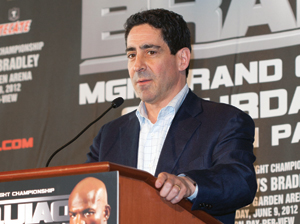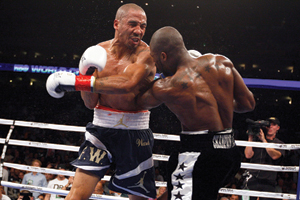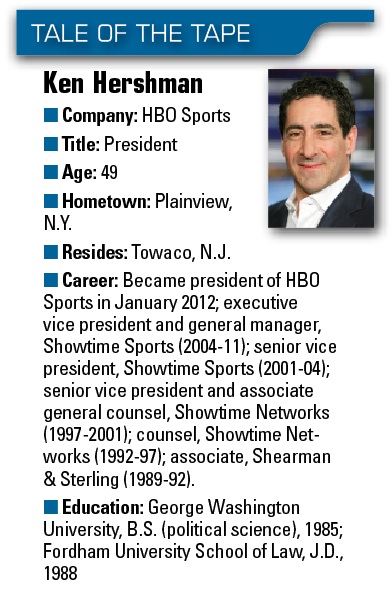Long before he landed the job as head of HBO Sports, Ken Hershman worked in the securities practice at a Wall Street law firm. Corporate finance didn’t excite him, but the firm was old and the sector was hot. It seemed a comfortable path.
The first deal Hershman worked on involved a paper company. As was customary in headier days, the bankers and lawyers who worked on the transaction each received a deal toy, a tchotchke that was the trophy of investment banking.
Hershman got a roll of toilet paper, suspended in an acrylic cube.
 |
Ken Hershman became head of HBO Sports in January.
Photo by: NEWSCOM
|
“I’m not sure this is really why I went to law school,”
Hershman thought as he examined the gift. “I decided at that point that pushing paper, getting a prospectus out and watching other people make hundreds of millions of dollars was really not all that rewarding for me.”
Hershman likes to say that he never charted a career path, never set out to run a network sports division or have a hand in boxing, let alone occupy what many consider to be the most influential position in the sport. And yet that is where he sits.
After three years at Shearman & Sterling, Hershman left for a job in the legal department at Showtime Networks, taking a pay cut. Mike Tyson was the network’s bell cow, and the on-again, off-again, back-on-again nature of his fights created lots of work for the lawyers. Hershman shined in the role and was promoted to general manager in 2004.
He bought some great bouts at Showtime, but for the most part the network lived in the long shadow of big-budgeted rival HBO. Then, in 2009, Hershman hatched an idea now seen as his signature. He created the Super Six, a round-robin tournament that would bring together six of the top seven fighters in the super middleweight division. While it was not without its pitfalls, the Super Six spun the boxing spotlight back to Showtime in a way it hadn’t enjoyed since the bizarro days of Tyson.
Last year, when HBO Sports President Ross Greenburg grew weary of the boxing business — and his bosses grew weary of his jousts with boxing’s power brokers — the network found his replacement at the offices of its chief competitor, about a nine-block walk up Broadway.
Hershman knew premium cable. He knew boxing. He knew the promoters and the managers, and had somehow managed to maintain cordial business relationships with almost all of them, which in the fight game is a feat.
At a pre-fight gathering of HBO guests on the night of Manny Pacquiao’s most recent pay-per-view at the MGM Grand, HBO’s president of programming, Michael Lombardo, explained the calculus that went into replacing Greenburg.
“It wasn’t that we were looking for someone in boxing, necessarily, but we needed someone who was familiar with the terrain,” Lombardo said. “About 75 percent of HBO Sports is boxing. And boxing is its own special beast. You can’t say I’ve done a lot of work in tennis or golf and that’s going to apply. It’s not. So that was issue No. 1.
“When you start talking to promoters, there are very few people that everybody speaks highly of. And I kept hearing from every promoter I was [talking to], ‘I know you’re looking. I don’t know who you’re talking to. I gotta tell you, though, you’d be lucky if you got that guy from Showtime. He doesn’t give me a lot of fights, but he’s a really straight shooter.’”
■ ■ ■
On the morning of Pacquiao’s stunning HBO pay-per-view loss to Timothy Bradley this summer,
Hershman sat over a cup of coffee at the MGM Grand, discussing his agenda for the rest of the day.
“My job this weekend has nothing to do with Pacquiao-Bradley,” Hershman said. “That’s all done. My job here is to talk to people in the [boxing] community who are partners of ours about where we’re going with future shows and future fighters. As we have those conversations, we figure out what comes next.”
This is how
Hershman’s job differs radically from those of his counterparts at ESPN or CBS or Fox. They all negotiate rights deals. But those come with a schedule, set by a league or sanctioning body. Fights are made piecemeal, with no schedule, or bracket, or ladder — or any format that dictates who will fight whom next.
As a result, Hershman spends much of his time and energy as a de facto matchmaker, not only bidding on fights but navigating to put them together.
“You can say Fighter A vs Fighter B is a terrific matchup, but that’s only a starting point,” Hershman said. “Fighter B has his list of options and challenges. And Fighter A has his list of options and challenges. So how do you start eliminating the challenges from the playing card and take some of the options away? How do you explain why these other options are not as attractive as the one that you would prefer? That’s the job. You make a marriage and hopefully the fight comes together. Sometimes it happens in 30 seconds. Sometimes it takes months.”
Too often, it ends in divorce.
In March, HBO was a month away from a “World Championship Boxing” card headlined by lightweights Brandon Rios and Yuriorkis Gamboa. The promotion included a press conference in Miami, Gamboa’s adopted hometown. Rios flew from Los Angeles to Miami. Gamboa didn’t show. A week later, he pulled out of the fight.
In May, HBO was nine days away from another “World Championship Boxing” event, a much-anticipated rematch between Amir Khan and Lamont Peterson, when the fight was canceled because Peterson tested positive for synthetic testosterone. Again, HBO was left without a show.
NBC couldn’t be certain this week’s Cowboys-Eagles would be a compelling matchup when it announced its “Sunday Night Football” schedule. But at least it knew they’d play the game.
“It’s frustrating — even maddening — but it’s part of the boxing business,” Hershman said. “When we got the call that Gamboa wasn’t fighting Brandon Rios. … I didn’t go through the ‘He’ll never be on our network again.’ That doesn’t serve anybody’s interest. In this sport, you just have to move forward.
“It’s like [when a pitcher] gives up a home run. If a fight falls apart, I just get up there and start throwing again.”
No promoter has dealt with Hershman more than Gary Shaw, who created the “ShoBox” series that for 25 years has given Showtime a low-cost platform on which to expose little-known fighters. Though the two enjoyed a mutually beneficial relationship, it was not without turmoil. Sometimes, Shaw was the one calling to tell Hershman a fight was off.
“When somebody would blow up a fight, he always kept his cool,” Shaw said. “He’d say, ‘What seems to be the problem? Let me look into it.’ Somehow it would come around. He didn’t want to lose a fight because of something between the promoters.
“He has the ability to deal with Lou DiBella. Lou’s my partner and he’s great, but he’s a nut job. When Ken put the Super Six together, dealing with me, and Lou and [fight manager Al] Haymon and [promoter Dan] Goossen — guys that aren’t all wrapped tight — he should have gotten the Nobel Peace Prize for holding that together. Ken’s a problem solver.”
Sometimes, the byproduct of a blown-up fight turns out to be better than the one it replaced. That was the case for HBO with both Rios and Khan this year. Hershman couldn’t be sure those cancellations would turn out as well as they did, but he’s been through enough to know how to react. He cut his teeth in the sport dealing with Tyson. That’s like learning to play tennis on ice.
One time, after getting the now familiar tattoo on his face, Tyson said he wasn’t showing up for a fight in Memphis against Clifford Etienne. When Tyson finally got on a plane to Memphis, Etienne’s manager said his fighter was backing out.
Hershman remembers sitting in a hallway outside his bedroom, a phone to his ear, with Etienne on the other end, walking the fighter through the ramifications he would face if he backed out at the last minute. He could make good on his commitment and make a payday of a lifetime, or skip it and face Showtime in court.
The fight went on.
“There’s a cycle to every major fight,” Hershman said. “Every one I’ve been involved in comes together and then falls apart. And so you just need to be prepared as you go through the cycle for the phone call — ‘It’s off! It’s off!’ Somebody’s panicked. Somebody’s angry. And then you say, ‘OK, what happened? We’ll put it back together.’ Some of them never come back. But it’s rare.
“A little bit of the chase is fun. But it gets tiresome at times.”
 |
Andre Ward (left), who won the Super Six event that Hershman pioneered at Showtime, is now featured on HBO.
Photo by: HBO |
The chess game of signing fights and fighters has dominated the story line in
Hershman’s first year at HBO.
Showtime replaced Hershman with Stephen Espinoza, an attorney who worked with Golden Boy Promotions. The two have spent much of the last 11 months in a thrust and parry over fighters. Several Golden Boy stars who made their names on HBO have fought on Showtime this year. Showtime’s Super Six champion, Andre Ward, now is a cornerstone of the stable at HBO.
Hershman won’t say much about the joust, insisting it’s part of a cycle that soon will settle. He prefers to talk about developments in both programming and promotion that he says will build the audience for boxing.
The network is developing more original shoulder programming around the sport, including an interview show hosted by Jim Lampley. It also has adapted its signature “24/7” show to a shorter form, which it will use to expose fighters who haven’t yet made it to pay-per-view.
Hershman also has loosened the spigot on the distribution of “24/7.” In September, HBO signed a content-sharing agreement with ESPN that will place “24/7” and other shows that promote HBO’s pay-per-view fights on ESPN’s channels. The deal also gives ESPN and ESPN Deportes access to live weigh-in and press conference coverage that previously was exclusive to HBO.
Last year, HBO began to use its Time Warner assets to promote its pay-per-views more broadly, running promos during Turner’s NBA and MLB telecasts and airing “24/7” on CNN and TNT. While that got “24/7” into more households, it’s unlikely that CNN delivered many pay-per-view buyers.
“ESPN offers a far more targeted audience and a more receptive audience,” Hershman said. “Turner has a great sports audience. But it’s seasonal. So if we’re doing a pay-per-view event and they’re not in-season with the NBA or baseball, we have a deficit there. This is an opportunity to reach out to sports fans 365 days a year.”
■ ■ ■
When
Hershman took the job at Showtime, the attraction wasn’t that he’d work in boxing, or even in sports. He was thinking more of parent company Viacom, and what it might be like to work with MTV.
But once he’d been across the table from boxing promoters who started a negotiation screaming and escalated from there; once he’d been on the phone with fighters who changed their minds about fighting; once he’d been forced to contemplate, as a lawyer, whether a man could be obligated — or, for that matter, allowed — to take a punch to the face if it was freshly tattooed; once he’d lived through all that insanity, well, Hershman knew what he was getting into when he took the top job in a sports division that is three-quarters boxing.
When he speaks of what it is that makes him the right person for the role, the first thing he mentions is experience. Right behind it is temperament.
“You have to maintain an even keel,” Hershman said. “That’s very important in this business. It’s very important that I don’t start flipping out over the little things or even the big things. Because that sets the tone for everybody else. There are going to be things that go wrong. It’s our job to fix them, or to move on and adjust.”
When he left his job at the law firm, Hershman hoped to work in-house for a company that made a product he could learn intimately. He wanted to be “part of something,” rather than traipsing from deal to deal.
The cube of toilet paper was his first, last and only deal toy.
He is certain he still has it, but hasn’t a clue where.






